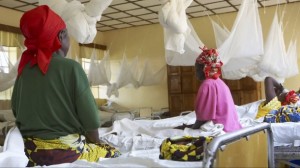Throughout history, sexual violence has been widespread in armed conflict and persists as a devastating phenomenon with damaging consequences on individuals — women, men, boys and girls — as well as their families and communities. The ICRC firmly believes that sexual violence in conflict can be stopped and is committed to further increasing its efforts in the prevention of this violation and to provide assistance to the survivors.

ICRC provides health care to survivors of sexual violence directly and also refers them to medical services for appropriate care ©ICRC
In line with this, the ICRC is participating in the Global Summit to End Sexual Violence in Conflict, taking place in London from 10-13 June 2014. Foreign Secretary William Hague is co-chairing the summit with Angelina Jolie, Special Envoy for the UN High Commissioner for Refugees. The Summit — the biggest such global meeting on this issue ever convened — welcomes over 100 countries and 900 experts, NGOs, survivors and international organisations from across the world that share a commitment to end sexual violence in conflict.
The Summit seeks to shatter the culture of impunity for sexual violence in conflict by launching a new International Protocol for documenting and investigating such violence. It will also urge countries to strengthen their domestic laws so that those responsible for sexual violence in conflict can be prosecuted.
ICRC President Peter Maurer addressed the Summit on June 12. “Every day we see sexual violence in the places where we are striving to make a difference. We witness the effects of this silent crime on individuals, families and communities… I believe the ICRC has an important role to play in the prevention of sexual violence and the global response to the victims. We talk: to people, leaders and policy-makers, to communities, families and victims. We carve out safe spaces for confidential dialogue. And we act. We must talk and act to end sexual violence in conflict.”
The ICRC works in many countries where the scourge of such violence exists. We strive to address both the causes and the effects of such violence by responding to the needs of those affected through our prevention and assistance activities. Our activities encompass providing health care, protection and assistance besides raising awareness and preventing violence.
Together with our Red Cross and Red Crescent partners, we are committed to improving the quality and the scope of our programmes. The ICRC has a distinct approach which complements the work of other actors. We seek to prevent sexual violence by strengthening law and policy, bringing about a change of culture within military organizations and addressing patterns of behaviour. And when sexual violence does, nevertheless, occur, we respond to the health, psycho-social and economic needs of victims.
Depending on the context, the ICRC may provide health care directly or it may refer victims to existing medical services for appropriate treatment and health care. We often support national medical structures, transportation and personnel in terms of capacity building, infrastructure and medical supplies. The ICRC also strives to integrate medical and psychological support in its health activities for victims of sexual violence. For instance, in the Democratic Republic of Congo, where rates of sexual violence are among the highest in the world, the ICRC runs counselling centres to provide psychosocial support to victims.
The ICRC also provides economic support to victims to assist them in rebuilding their lives. Apart from this, we work in consultation with local communities to raise awareness, identify risk factors and develop protection strategies against sexual violence.
Sexual violence is deeply linked to other patterns of violence in conflict and is absolutely prohibited under International Humanitarian Law. All parties to an armed conflict must abide by these prohibitions and all states have an obligation to prosecute the perpetrators. The ICRC, on its part, is determined to do everything it can to bring this violence to an end.
Resources:
ICRC President Peter Maurer’s speech
Global Summit to End Sexual Violence in Conflict
Sexual violence in armed conflict: Questions and answers
Breaking the silence, interview of Angela Veale, psychology lecturer at University College Cork, Ireland
DRC: Telling the story and overcoming the trauma, interview of Caroline Marquer, ICRC mental health and psychosocial support advisor
Transitional justice and sexual violence, interview of Cécile Aptel advises on legal policy at the UN Office of the High Commissioner for Human Rights
ICRC New Delhi


